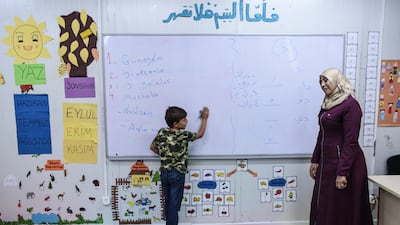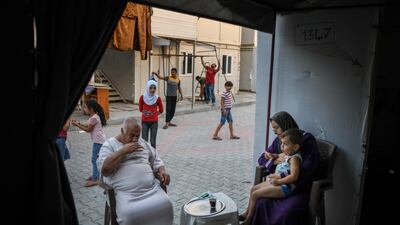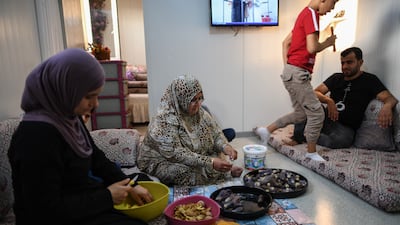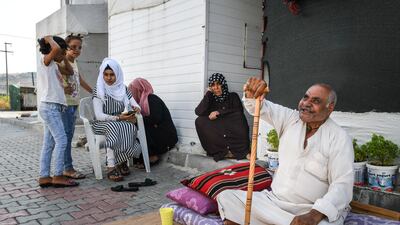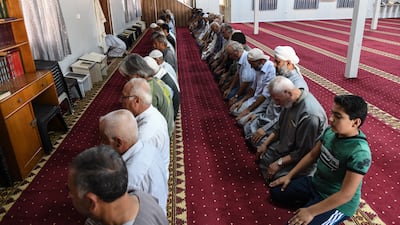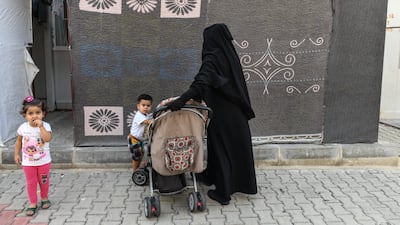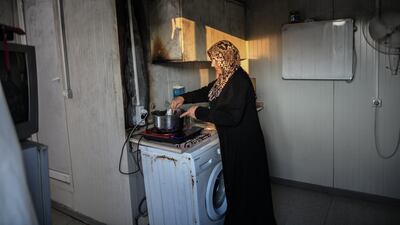Turkish President Recep Tayyip Erdogan on Tuesday unveiled a plan to return one million Syrian refugees to their country as he tackles an economic crisis and sagging popularity before elections.
Mr Erdogan said people could return to the 100,000 houses in what Turkey calls a "safe zone" in north-west Syria.
“We are now preparing a new project that will enable the voluntary return of one million Syrian brothers and sisters” to areas secured by Turkish and allied forces in northern Syria, Mr Erdogan said in a video message to mark the delivery of homes built by Turkey’s disaster management authority.
Turkey hosts more than four million Syrians who fled the civil war in their country. Turkey is home to the world's largest refugee population, of which Syrians form the largest single group.
Ankara has spent about $100 billion on housing, medical care and schooling for Syrians who began to arrive weeks after the conflict began in 2011.
Mr Erdogan said more than 57,000 houses for 50,000 families had been built in the Idlib area with the support of Turkish and international NGOs, as well as local councils in Syria.
Turkey has troops in parts of north-west Syria and supports militias and hard-line factions in the area. Mr Erdogan has discussed the importance of creating safe zones in the region to allow those who fled the war to return.
But the government has not yet persuaded Syrians to volunteer to travel to the areas, which reportedly include Azaz, Jarablus, Al Bab, Tal Abyad and Ras Al Ayn.
However, the move is likely to win the government support among voters who are increasingly worried about overcrowded classrooms, increasing wait times at hospitals where refugees are treated free of charge, and other pressures of hosting large numbers of refugees.
Mr Erdogan will seek to cut inroads made by nationalist Umit Ozdag, the 61-year-old leader of the Zafer Party, who has vowed to send millions of refugees home.
Many of Turkey's houses are around Idlib, the last rebel-held area of Syria. The province, however, is surrounded by Syrian forces with backing from Russian, Iranian and Hezbollah allies who regularly clash with rebel factions and hard-line groups.
Air strikes have destroyed almost all of the hospitals in the area, as well as other vital infrastructure.
The UN has said Syrian and Russian air strikes and ground operations in Idlib have driven about a million civilians from their homes since December 2019.
After 11 years of war in Syria, hundreds of thousands have been killed, with more than half of the country’s pre-war population of 22 million displaced.
In 2018, Turkey and Russia reached an agreement to stop an all-out military operation led by the Syrian army and its backers to take control of Idlib amid warnings from the UN of a “bloodbath".
Since then, the Syrian army has regained control over major towns in southern Idlib in limited operations backed by Russia.
It is not clear whether Turkey has co-ordinated the housing project in Idlib with Russia or the US. Idlib is mainly controlled by an umbrella group of opposition militants called Hayat Tahrir Al Sham.
Russia has taken part in joint security patrols with Turkey in the Syrian territory, while the US backs the Kurdish-led Syrian Democratic Forces (SDF), which controls areas of the north-east of Syria around Qamishli and Al Hasaka.
The SDF fought against Turkey's military push to create a buffer zone in the north-east in 2019.
Turkey’s return of hundreds of thousands of Syrians comes as the government faces increasing pressure from opposition parties to reduce the number of refugees in the country.
Tens of thousands of Syrians have tried to reach Europe by boat from Turkey since 2015 but numbers dropped off after a deal between Ankara and Brussels to stem the flow in exchange for financial support to continue hosting them in Turkey.
In 2020, Mr Erdogan said the EU was no longer offering help to help accommodate the large number of refugees hosted by his country.
He said he was not responsible if many again tried to reach Europe because his government could no longer cope with the number of Syrians and other refugees fleeing their home countries.
The UN has repeatedly issued warnings that refugees must return to their homeland voluntarily, with forced returns a breach of international law, while evidence shows that refugees returning before it is stable or safe can exacerbate the situation.


